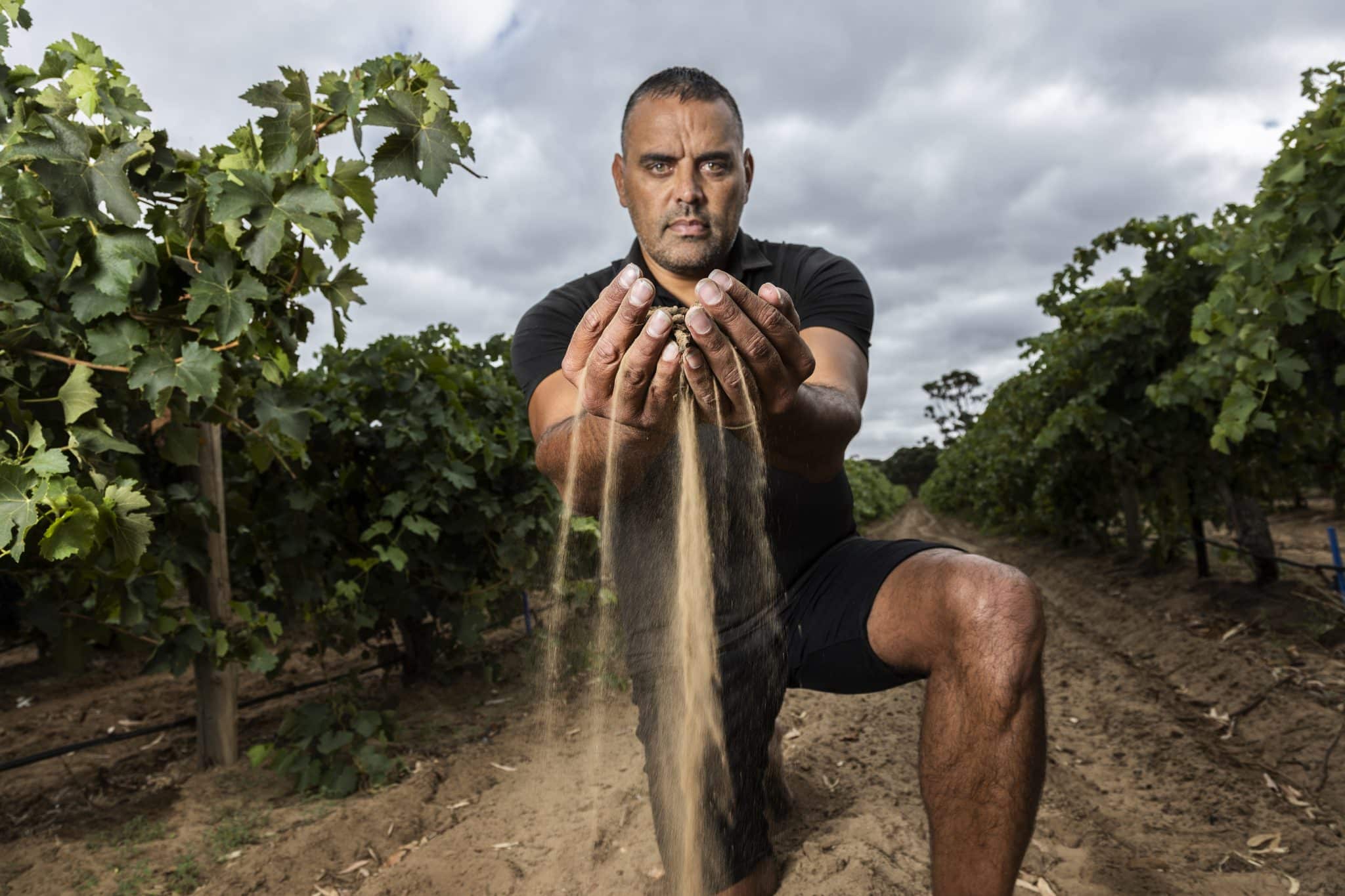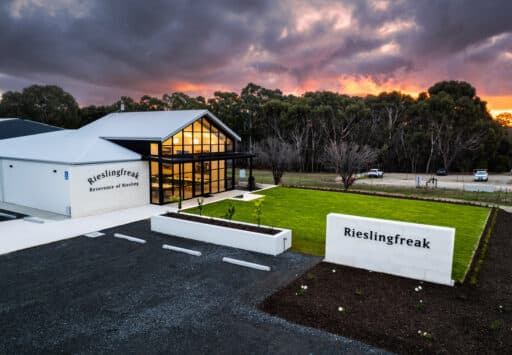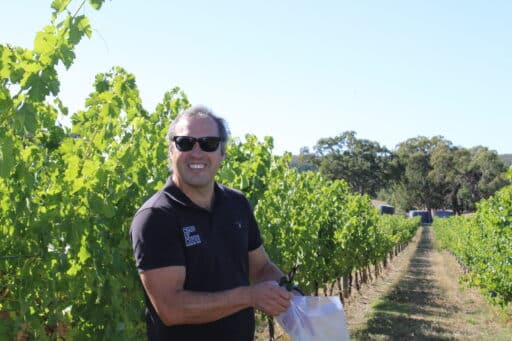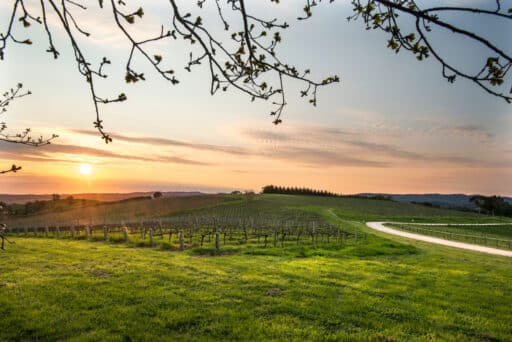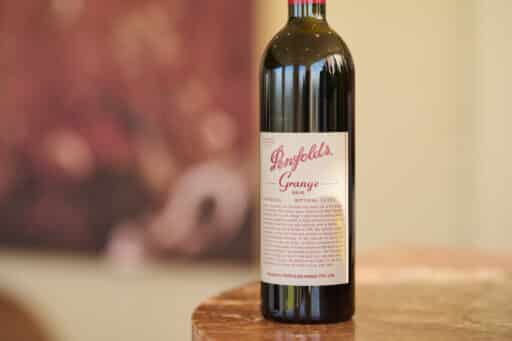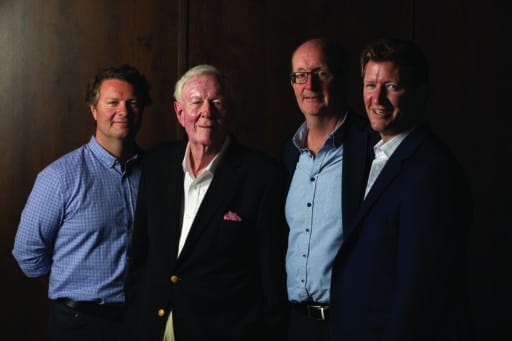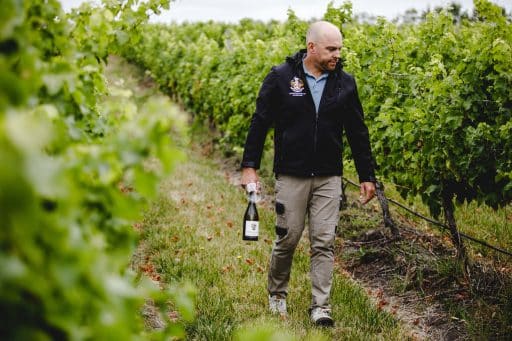About a month ago I was helping a friend in his wine shop, and I happened to come across Munda Wines for the very first time. Now, I’m not easily seduced by pretty labels, as in my experience, unfortunately wines are not always up to their arresting package.
When candidly admitting that Munda packaging had drawn me in and I wanted to know more about it, co-owner Damien Smith happily exclaimed “Great; that ‘tell me more’ is probably one of the core motivators of why we are doing this.” He continued “It’s not (about) education, we want people to go on their own journey. And wine is that beautiful vehicle to start this conversation.”
As a bilingual person, I ask Damien for the Munda translation and he explains to me that this word is from the Wirangu (far west coast of South Australia), and Kokatha Country (Gawler Ranges up to Maralinga). Paul Vandenbergh, Munda director and co-owner, is a First Nations man whose ancestors are from those countries, and in his language, Munda means soil, land, Country, or terroir.
Thinking about how the French have successfully turned their own word “terroir” into a worldwide success, I advance the question (perhaps arrogant but certainly led by genuine curiosity) “in your opinion, should Munda become the official term of the unique Australian terroir, regardless of winery ownership?”
Damien pauses for a few moments. He is very cautious with his answer: “I think that this is probably very dismissive, based on all the different Indigenous languages (250). I don’t think that is necessarily right, but on the other side for the ease of communication, yes, you could argue that. But (in the hypothesis of that happening), we will still not be going to claim that Munda is the only word for terroir, land, or country in Australia”.
When I ask about the philosophy behind Munda wines, Damien speaks of minimal intervention, as both him and Paul want that sense of place, Munda, to be at the front and centre of each wine. “Our Grenache is from Vine Vale and what we ask ourselves: “what is its sense of place?” How those vines grown on those sandy soils from that Country are going to communicate Munda soil?” For that, blending different parcels of land to make a sound and palatable wine doesn’t interest Damien and Paul.
Oak is used but must be old, French, with no dominant flavour characteristics. “Our wines need to be brighter, prettier, enticing, perfumed. They say “like me or don’t like me, but this is where I’m from and this is who I am”. They are also experimenting around the use of native Indigenous oak. “It adds another layer to Munda” Damien says.
Munda Wines has had long-term friendships with their contract winemakers, some of the very best in the country (Renae Hirsch from Chalk Hill and Marco Cirillo from Cirillo Estate to name a few). “Those winemakers want to work with us and to understand more of the history of their region/country” Damien admits. “Stylistically, they were very open to the personality of the wines that we wanted to portray, to reflect that sense of place.”
Despite the oddities, Damien sees a very bright future ahead for Munda Wines. “20 years ago, I don’t know if all of this would have resonated. But we’re on the right track, the response from the market has been positive.” Munda has been actively working with key businesses such as WSET (Wine and Spirit Education Trust) and Negociants Australia (their current wholesale distributor) to change the narrative in Australia. “Back in the days, I’ve been working with Moët Hennessy in New Zealand, and I was intrigued with the Maori culture. You go out for a coffee, and you have Maori baristas that are so infectious, and extroverted. And they want to tell their stories. We don’t have that here in Australia.”
There are also prospects of working with Indigenous mobs from other countries around the
world to explore more stories, languages, food, drinks, cultures and ultimately senses of place. And Paul is working hard to involve young First Nations people with the winemaking side of things, as ideally Munda wines will be made by Indigenous winemakers.
Damien is vocal about Munda Wines being a business with an important story to tell, rather than as a high scores or glowing reviews chaser. As Damien says, the key goal of Munda will always be “to have Australians explore the world’s oldest surviving culture, which we have so much to learn from.”
And the wines unquestionably speak for themselves.

Munda Walgalu Country (Tumbarumba) Chardonnay 2022
96 Points | $45.00
Intense aromas of lemon pith, quince, nectarine, mandarin zest, yellow blossom, pink grapefruit, with a mineral-salty sharp edge cutting through. A vibrant, yet seductive/velvet acidity, with a strong mid palate presence as you are almost sucking into a Meyer lemon or freshly shucked oyster. It’s a Chardonnay with a well-defined “six-pack” and the athletic silhouette of an Olympic 100m runner. A runner that keeps the momentum until the very end of the sprint, with an incredibly savoury/nutty, citrusy, juicy aftertaste. If this is the Walgalu Country (Tumbarumba) speaking, then I’m all ears. Enjoy with grilled abalone, Smoky Bay oysters, or razor fish. Drink: now- 2030.

Munda Ngadjuri + Peramangk Country (Barossa + Eden Valley) Grenache 2022
95 Points | $45.00
Attractive and pretty, super perfumed Vine Vale Grenache that talks of raspberries, those rare wild raspberries that you don’t find at the supermarket so easily nowadays. Then it’s preserved strawberries, craisin (dried cranberries), wet red clay and dried bushes, and those unique scents of the Australian countryside. The palate is sweet red fruited, yet earthy and savoury and full of dried extract. It almost feels like someone has harvested wild red berries, native herbs and has squeezed them all together into the wine. The more I smell and taste this wine leads to more perfumed notes inundating my nose and palate. The length is reserved and ultra-fine, perhaps shying away from the striking mid-palate. Enjoy with grilled rare Southern bluefin tuna with spicy sauce. Drink: now- 2033.

Munda Kaurna Country (McLaren Vale) Syrah 2021
96 Points | $45.00
Crushed black pepper, blue violets, preserved blueberries, mulberries, black plums, dark chocolate (the type that goes from 85% and above), infused cloves, Chinese black tea leaves, black liquorice. There is a level of detail, focus and purity of fruit across those wines. Again, with this Blewitt Spring Syrah the palate shows a generous side; it’s well balanced by a vibrant acidity that makes me salivate for another glass. A fine, succulent Syrah indeed. The naysayers might think that I’ve been captured by the story behind those labels, but as a wine lover I’m just saying what I see without my thick prescription glasses. Enjoy with slow roasted Kangaroo tail and native yam daisy. Drink: now-2035.

